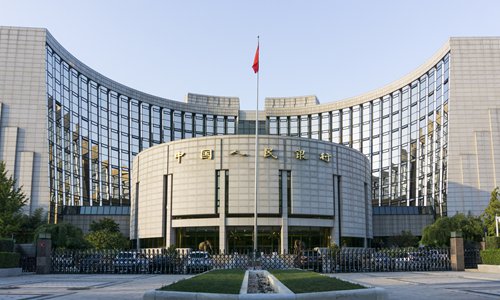HOME >> BUSINESS
China's central bank governor "disappointed" with failure of IMF quota increase
Source:Xinhua Published: 2019/10/20 7:18:51

Headquarters of the People's Bank of China, China's central bank, in Beijing in October 2018 Photo: IC
China is "deeply disappointed" that the International Monetary Fund (IMF)'s latest quota review failed to agree on a quota increase and a quota share realignment, Governor of the People's Bank of China Yi Gang said Saturday.
"The IMF should continue to push ahead with quota and governance reforms, which are a prerequisite for the IMF to fulfill its mandate," the Chinese central bank governor said in a statement to a meeting of the International Monetary and Financial Committee (IMFC), the IMF's policy-setting body, on the sidelines of the annual meetings of the IMF and the World Bank in Washington.
The Group of Twenty (G20) summits and the IMFC meetings have made several commitments to a successful conclusion of the 15th quota review, "so that quota shares of the dynamic economies can be increased in line with their relative positions in the world economy," Yi said. "Those commitments should be respected."
China supports a strong, quota-based, and adequately resourced IMF to preserve its central role in the global financial safety net, he said, noting that quotas are the global lender's main source of financing.
"The failure to adjust quota shares undermines the representation, governance, and legitimacy of the IMF," Yi said.
The central bank governor said China looks forward to the IMF's commitment on future quota share adjustments with "a clear timetable and roadmap."
"China will, along with the other parties, continue to push for reforms of the IMF's quotas that will strengthen the voice and representation of emerging market economies and developing countries, narrow the gap between actual and calculated quotas in a constructive manner, and reduce distortion in quota structure to reflect members' relative positions in the global economy," he said.
The IMF announced on Friday that its members agreed to a reform package that will maintain its funding level and delay any quota changes.
Currently, the global lender has 1 trillion US dollars in total lending resources, made up of quotas, the New Arrangements to Borrow, a multilateral borrowing mechanism that provides additional lending resources, and the Bilateral Borrowing Agreements, a further boost to IMF's lending capacity after the 2008 financial crisis.
The IMF's 14th quota review was concluded in 2010 and the quota increases became effective in 2016. After the reform, some 6 percent of quota shares were shifted towards emerging markets, including China and India.
The United States, with 16.5 percent voting power, can still veto any boost in any member's IMF quota, as any such change requires an 85 percent weighted majority vote of its members.
"We note the lack of progress on a quota increase under the 15th Review and call on the Executive Board to complete its work on the 15th Review and on a package of IMF resources and governance reforms, and to report to the Board of Governors as soon as possible," the IMFC said in the statement Friday.
"Beyond the 15th Review, we are committed to revisiting the adequacy of quotas and continuing the process of IMF governance reform under the 16th General Review of Quotas, including a new quota formula as a guide, with the Review to be extended from 2020 to no later than December 15, 2023," it said.
Posted in: ECONOMY